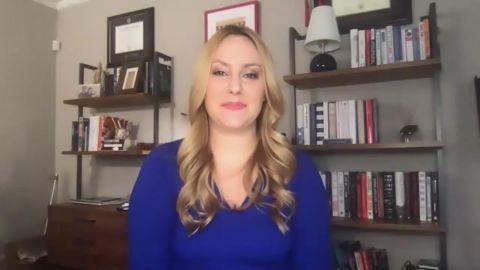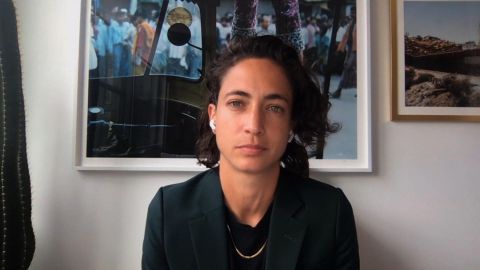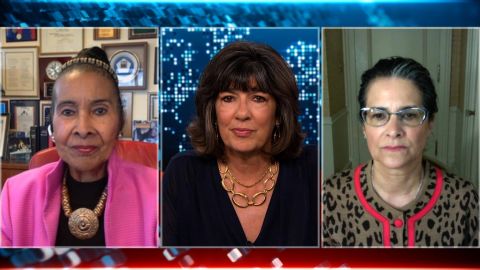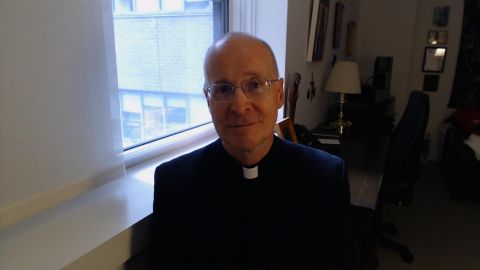Read Transcript EXPAND
CHRISTIANE AMANPOUR: And our next guest is on that beat covering voting rights. Jessica Huseman is lead reporter for ProPublica’s Electionland project. It’s a coalition of newsrooms across the U.S. which investigates problems with ballot access, vote by mail and misinformation. And, here, she’s talking to our Michel Martin about those challenges during this pandemic.
(BEGIN VIDEOTAPE)
MICHEL MARTIN: Thanks, Christiane. Jessica Huseman, thanks so much for joining us.
JESSICA HUSEMAN, PROPUBLICA: Thank you so much for having me.
MARTIN: Let’s talk about sort of the two different perspectives. So, Republicans tend to complain about voter integrity, and Democrats tend to complain about voter suppression. But is there a truth to either of those claims?
HUSEMAN: I think that the truth exists somewhere in the middle, as all things. I certainly do not believe that fraud is as prevalent as voter suppression. So, I think that the truth exists more towards that angle of things. But I do think that there has become a strain of left-wing advocacy that is, in its — at the end having the exact same impact as the right-wing voter fraud advocacy. So, you can only insult the system and say that your vote will not count so many times before people start to believe you, regardless of the cause of your vote not counting. So, whether you believe that the system is inherently flawed and not worth your vote because it’s overrun by illegal immigrants who are casting fraudulent ballots, which is not true, or whether you have decided not to cast a ballot because you believe that your vote won’t count because of who you are or because of suppressive tactics or because you think that the machines are inherently flawed, and you choose not to vote, at the end of the day, you’re still choosing not to vote. And so I think that activists on both sides, which is a phrase that I hate to use, but is unfortunately apt here, I think that activists on both sides need to take not only their end goals into account, but the way in which they are de-motivating and discouraging people from going to the polls right now.
MARTIN: But if your goal is to de-motivate people from going to the polls right now, then you have succeeded, right?
HUSEMAN: That’s true. But I don’t know that the left would say that that’s their goal. But I think that might be the impact of some of the things that they’re doing, blowing a long line out of proportion. Or saying, for example, that the city of Louisville is going to have four-hour wait lines because they have assigned one polling location to 600,000 residents is technically true, but not helpful. That’s, like, not a helpful way to look at that voting situation. And there were no lines in Louisville all day. So, while election administrators did the best they could with a gigantic facility with lots of polling sites in it, how many of those people heard there’s going to be a four-hour-long line in Louisville, and just chose not to show up? So, I think that there is a fine line between very loudly advocating for change, and then going so far that you sort of push people over to thinking that there’s no point, and there’s no point in engaging with the system at all.
MARTIN: Let’s talk about some of the issues that have the — that have surfaced very loudly, or been surfaced very loudly, during this sort of current election cycle, which, of course, is taking place during — in the context of a worldwide — a worldwide health crisis, a serious disease, which is spread by people being in close contact with each other, whether they want to be or not.
(LAUGHTER)
MARTIN: So, let’s just throw that into the mix. Mail-in ballots is something that President Trump has been harping on, his conservative or far right conservative conspiracy-minded theorists have been and supporters have been harping on. What’s the deal with mail-in ballots. Why is this kind of the focus of their ire? The president has voted by mail for years. I think everybody knows that. So, why is this the focus of their concern right now?
HUSEMAN: I think that they view this as a bit of a Hail Mary pass. I think that they see where the polls are. And so their intention — and they have been foreshadowing this since 2016, even after he won — is to call the results of the election to question, rather than being very concerned about going after those votes with different messaging or with an altered approach. I think that his intention is really to cause so much confusion that people either do not exercise their right to vote by mail, or it becomes so confused, that he can litigate then after. And both things are not good. And I think that he has perversely had, and obviously intentionally, a really interesting impact on turnout. If you look at the rates at which people are returning their vote-by-mail ballots, they are doing it much quicker than they have in previous years. And so I think that all of his complaints about vote by mail and the system and the lack of credibility of the USPS has encouraged people to interact with the system in a way that actually makes it work better. So, we will likely know the results of Election Day way sooner than we otherwise would if we didn’t have a president using his bully pulpit to talk about vote by mail a lot. So, I don’t know if that’s his intended effect, but that’s what’s happening.
MARTIN: Well, talk to me about vote by mail, because you say that there actually is the potential for fraud…
HUSEMAN: Sure.
MARTIN: … in vote by mail. And you’re, frankly, just one of the few reporters who’s been willing to say that. Why is that, particularly given that a number of states, a minority of states, but a number of states have a long history of voting by mail? Oregon votes entirely by mail. I mean, they have a few in-person voting locations. Mainly, what I hear is that people haven’t made up their minds until the last minute, so that’s why they go to the sort of the few polling places that are available. But their system is overwhelmingly vote by mail. But you said there is that potential. Why is that? Objectively, there is.
HUSEMAN: Yes. So, there are states that do this really well, and have done this for a long time. There are, of course, the states that vote all by mail. There are also states like Arizona, or Georgia, for example, where a very — or Florida, where a very high percentage of the population votes by mail, because it’s a no absentee — no-excuse absentee state, and anyone can vote by mail. And then there are states where almost no one votes by mail. So, for example, the state of Kentucky was in the single digits for percentage of the population that voted by mail. And now about half of the state is going to vote by mail. And while Oregon had a decade and Washington had six years and Hawaii had seven, the rest of the states that have gone from zero to 100 have only had six months. And that’s if they immediately went that direction, and only a minority of states have. And so while they can certainly use the lessons that the states that have been doing this for a really long time have learned, every state’s election system works so much differently, that you still have to make incredible adjustments, issue a lot of funding, to make sure that people have the paper goods, the sorting and letter opening equipment, the scanning equipment. It’s an entirely different way of voting. And so, while people have in states across the country have been buying new voting equipment, and really sort of preparing themselves for a 2020 election for years, they didn’t anticipate the 2020 election would look like this. So, we’re having to redo a lot of our efforts in the last few months. And that speed can lead to — can lead to mistakes. And so I want to be very clear that I don’t think that this would lead to increased intentional voter fraud. And I don’t think that this will lead to, like, intentional election fraud either. But I do think that, as we have already seen, there are room for errors in states that have just not done this before
MARTIN: Speaking about sort of a deep concern generally of progressives, it is a fact that the statistics have shown that African-Americans and Latinos tend to have their ballots rejected at a higher rate. Why — and that leads to the obvious concern on the left that there’s some sort of conspiracy or two, there’s a motivated effort to disqualify these ballots.
HUSEMAN: Yes.
MARTIN: Why is that, based on your reporting?
HUSEMAN: You know, I think that something that a lot of people don’t take into consideration is that a lot of voters of color are brand-new voters, or have never voted by mail before. So, even if you have been voting in the same way for a really long time, and you are a traditional voter, you go to the polls every time they open, you may not have ever cast about on your own by mail. And voting by mail is a very difficult thing to do. There’s a very specific list of instructions that you have to follow. Those instructions vary by state, and sometimes by county. And so it’s difficult to have a statewide or a national education campaign on going to vote, because you can have a statewide education campaign that says, Election Day is November 3, go to your polls, because that applies to everybody. You can’t really say, hey, everybody, the ballot — the deadline for requesting your absentee ballot is October 15. And please sign the back, because that’s not the rule in every state. So, education campaigns are a lot more limited. States have not dedicated enough money to them. And so the people that that’s going to hit hardest are people who do not vote often or whose vote is being cast in a new way for the first time.
MARTIN: Another complaint that many people have raised is polling stations themselves. ProPublica pointed out that non-white Georgia voters tend to be living in areas where the lines were, in fact, the longest. That is a fact…
HUSEMAN: Absolutely.
MARTIN: … as reported by your organization. So why is that? I mean, people look at something like that and say, how is that not an effort to keep people from voting by making it so inconvenient that they will get discouraged?
HUSEMAN: I think that a lot of the issues that we see in these large cities are — and this sounds quite firm, but issues of incompetence, rather than malice. I think that these areas have been so poorly funded, which is a remnant of the long history of racism in America, that they don’t have enough resources to be as effective as they needed to be. They cannot hire enough staff, they cannot get enough equipment. And then you toggle that on to very political struggles between local governments and the state government, and we’re kind of setting these very populous cities up to fail. I think that the Republican Party loves to focus on meltdowns in large inner cities, like Detroit or Atlanta, and talk about how elections in these places are rife with fraud. That’s not true. They’re rife with mismanagement. And then, also, Republican cities are not exempt from this level of mismanagement. There have been several large Republican cities and suburbs that have had major election malfeasance. I think we just need to take a couple of steps back. The suppression does not necessarily happen at the level of the county clerk or the elections office. It happens at the state legislature level by choosing not to give election administrators the resources that they need and by choosing to allow counties to apportion their own tax dollars to this county or that county, thereby allowing this county to have more polling locations and that county to not. So, in the same way that there have been disputes over education funding and the equity of education funding disbursement, I think there should also be for issues of election administration.
MARTIN: Are there places that contradict the stereotype? The Kentucky secretary of state, for example, campaigned on a platform of opposing mail-in voting, opposing absentee balloting and so forth, and in the wake of the COVID-19 pandemic has completely pivoted, who’s a Republican?
HUSEMAN: Yes, and I think that this is a little bit of an undertold story. If you focus just on the congressional and Senate debates over voting and vote by mail and the coronavirus, you get a very different picture than if you just go one step down and look at state election administrators. By and large, Republicans have not been nearly as opposed to vote by mail as federal level Republicans who are screaming and crying in Washington, D.C. I mean, you saw, for example, the Republican secretary of state for Kentucky expanded early voting. His state has literally never had early voting before. There was no vote by mail in Kentucky before this. I think that they have taken a really, interestingly, bipartisan approach. The secretary of state is, obviously, as I said, a Republican. The governor is a Democrat, and so is the director of the state board of elections. And so they, I think, decided to see where the political reality was and came up with a very realistic solution. The same has happened in Iowa under Republican Secretary of State Paul Pate. And this is going to surprise voters, but one of the few states that proactively sent not just notifications that vote by mail was expanding, but actual absentee applications to every registered voter, was the state of Georgia. So there’s a very different sort of outlook on this election and the severity of COVID and the importance of vote by mail for state and local Republicans, even if there’s not for federal ones.
MARTIN: I understand that there are hundreds of legal challenges already being made around the sort of election processes. And give me some of the broad patterns.
HUSEMAN: Yes. So, I mean, I think that there are lawsuits that have taken kind of two types. So, the first type of lawsuit is over how people cast their ballots, right, how many drop boxes there should be in the state of Texas and the state of Ohio, whether or not it’s OK to have a polling location here or There. Those impacts sort of a small number of voters who are accessing that specific type of voting. And then there are lawsuits that I think are more concerning in the long run, which are a section of lawsuits that talk about how the votes are counted, when they’re counted, how long ballots can be accepted after Election Day, as long as they’re postmarked by Election Day, when people can start counting. This is something that’s going to affect the entire trajectory of the election. So, I’m particularly interested in decisions like the one that came out yesterday about Pennsylvania from the Supreme Court that was 4-4 that essentially ruled that Pennsylvania could continue to count absentee ballots as long as they were postmarked by November 3, and the ongoing litigation in Wisconsin about how long and in what way the clerks there can process absentee ballots. So, those lawsuits, I think, are very likely to have an impact not only on those states, but on the entire country. As you have heard President Trump message repeatedly, he’s under the impression, which is false, that if we don’t have definite results on election night, then fraudulent behavior has occurred. We have, in fact, never had the result on election night. But the litigation moving closer and closer and closer to the time where that decision has to be made will only confuse things more and delay that decision even more. So, his own lawsuits are really having more of an impact on this than he would if he said nothing.
MARTIN: What concerns you most about November 3, recognizing that voting has already taken place, as you have pointed out?
HUSEMAN: Right.
MARTIN: But is there something in particular that concerns you about Election Day itself?
HUSEMAN: I think that Election Day is such an emotional day, and it will be particularly emotional because we are in such a polarized place right now. And I think that the thing that concerns me most is people taking very expected election setbacks — they occur every year — elections are run by people — and panicking about them and setting off quite a lot of emotion that’s not necessarily justified. We have seen that as we have watched the election in the last couple of years, in 2016 and 2018. So, certainly, that’s already happened. But this year, we seem to be at such a high emotional tenor, that I’m worried that we’re going to see sort of eruptions of people screaming at each other at the polling location, even if they didn’t set out to go to that polling location to scream at people. Like, emotions are just running so high. And so I think that people who experience solvable and expected setbacks will assume that those are either fraud or suppression, and act accordingly, rather than just sort of calmly solving the issue as it presents itself.
MARTIN: Jessica Huseman, thank you so much for talking with us.
HUSEMAN: Thank you. I appreciate it.
About This Episode EXPAND
Jesuit priest James Martin responds to Pope Francis’ public endorsement of same sex civil unions. Xernona Clayton and Martha S. Jones reflect on civil rights and the election. Paola Ramos discusses the Latinx vote and her new book. Journalist Jessica Huseman joins Michel Martin to debunk voting misconceptions.
LEARN MORE



